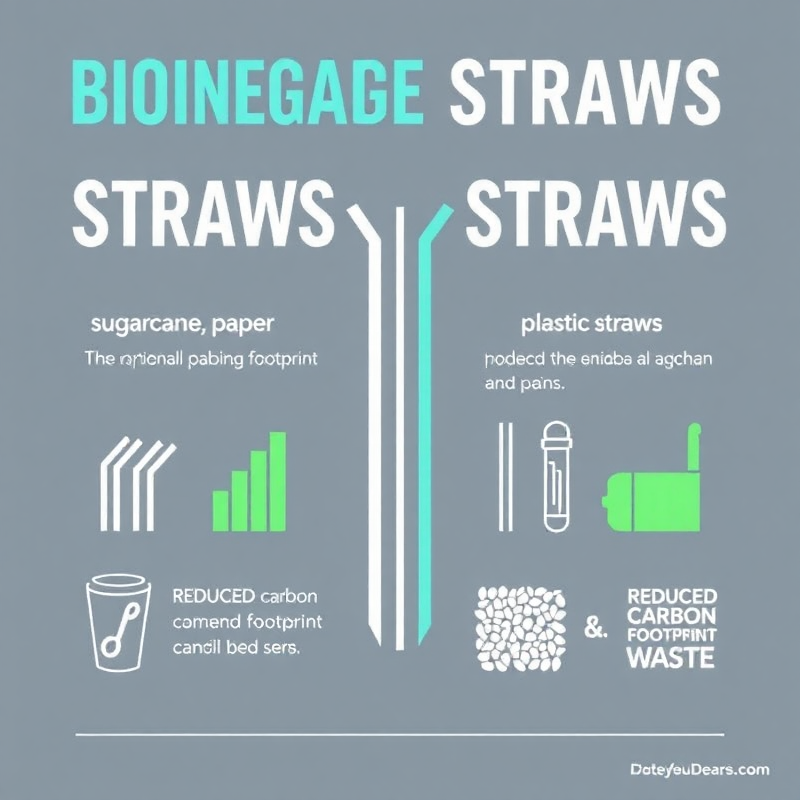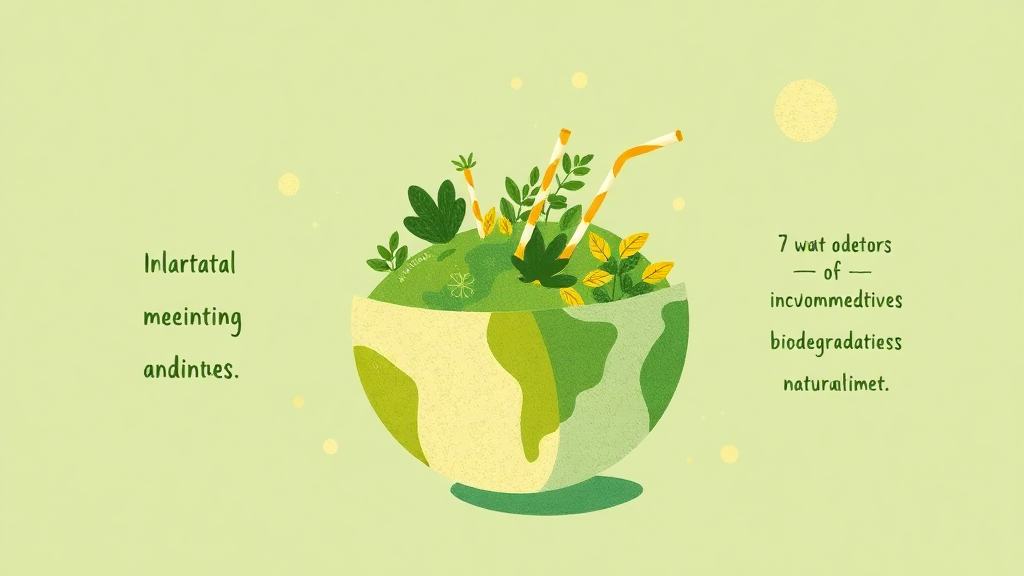 The global shift toward sustainability necessitates businesses prioritize plastic waste reduction. Single-use plastics, especially straws, significantly contribute to environmental degradation; 8.3 billion metric tons of plastic waste have been generated since the 1950s. Eco-conscious businesses and restaurants seeking sustainable alternatives should consider sugarcane straws—a scientifically validated solution balancing environmental responsibility with operational efficiency. Your business can make a difference.
The global shift toward sustainability necessitates businesses prioritize plastic waste reduction. Single-use plastics, especially straws, significantly contribute to environmental degradation; 8.3 billion metric tons of plastic waste have been generated since the 1950s. Eco-conscious businesses and restaurants seeking sustainable alternatives should consider sugarcane straws—a scientifically validated solution balancing environmental responsibility with operational efficiency. Your business can make a difference.
Why Sugarcane Boba Straws Are a Game-Changer
Sugarcane straws are manufactured from sugarcane bagasse, a fibrous byproduct of sugar production, combined with plant-based binders like polylactic acid (PLA). Unlike traditional plastic straws, they offer key advantages:
- Biodegradability: They break down naturally within 3–6 months in home compost systems and are certified for industrial composting (ASTM D6400). This contrasts sharply with plastic straws which persist for centuries.
- Compostability: Their certification ensures responsible disposal, reducing landfill burden. This is a crucial differentiator from many other alternatives.
- Renewability: Utilizing agricultural waste instead of fossil fuels promotes a circular economy and reduces reliance on virgin materials. This significantly lowers the carbon footprint compared to plastic production.
A 2023 lifecycle analysis revealed गन्ने का टुकड़ा reduce carbon emissions by 52% compared to plastic, solidifying their position as a cornerstone of zero-waste solutions and green business practices. This data-driven advantage should be a compelling factor for businesses aiming for sustainability goals.

Key Benefits of Switching to Sugarcane Straws for Your Business
1. Environmental Impact Reduction:
- Plastic Waste Mitigation: Replacing plastic straws directly prevents non-recyclable waste from entering landfills and oceans. Consider the staggering statistic: the U.S. alone discards 500 million plastic straws daily. Switching to sugarcane straws represents a substantial reduction in this waste stream.
- Ecosystem Protection: Marine life is significantly impacted by plastic pollution. Biodegradable sugarcane straws mitigate this risk, protecting vulnerable ecosystems.
- Resource Conservation: Repurposing bagasse, a waste product, exemplifies circular economy principles, reducing reliance on virgin materials and minimizing environmental impact.
2. Operational Advantages for Your Businesses:
- Brand Differentiation: Attract eco-conscious consumers. Studies show 72% of consumers prefer brands committed to sustainable practices. Highlighting your use of sugarcane straws can be a powerful marketing tool.
- Regulatory Compliance: Proactively address evolving regulations. Many cities (like New York) and countries (like Canada) are implementing bans on single-use plastics. Using sugarcane straws ensures compliance and avoids potential penalties.
- Cost Efficiency: Bulk purchasing options (e.g., $20 per 1,000 units) offer cost competitiveness with paper alternatives, while offering superior performance. Consider negotiating bulk discounts to further enhance cost-effectiveness.
3. Performance Excellence:
- Durability: Sugarcane straws withstand liquids for 4–6 hours without becoming soggy, surpassing the performance of paper straws. This ensures a positive customer experience.
- Versatility: Suitable for both hot (up to 176°F/80°C) and cold beverages.
Sugarcane Straws: A Sustainable Solution for Businesses

Expanding their usability. This eliminates the need for separate straw types.
- Taste-Neutral: Unlike some alternatives, sugarcane straws provide a neutral taste experience, ensuring the beverage flavor isn’t compromised.
Sugarcane vs. Other Eco-Friendly Straws for Your Businesses
| Material | biodegradability | Durability (Hours) | Cost per 1k Units (USD) | Carbon Footprint |
|---|---|---|---|---|
| Plastic | Centuries | Indefinite | 10 | High |
| Paper | 2–6 weeks | 0.5–1 | 15 | Moderate |
| Sugarcane | 3–6 months | 4–6 | 20 | Low |
By switching to sugarcane straws, businesses can significantly reduce their environmental footprint, enhance their brand image, and improve operational efficiency. This transition represents a responsible and impactful step towards a more sustainable future.
Choosing Sustainable Sugarcane Straws for Your Business
Consider the environmental impact of your packaging choices. Sugarcane straws offer a superior alternative to plastic straws.

Switching to sugarcane straws is a simple yet impactful way for your businesses to embrace sustainability.
| Material | Degradation Time (Landfill) | Degradation Time (Compost) | Cost per 1000 Units | पर्यावरणीय प्रभाव |
|---|---|---|---|---|
| Sugarcane | 3–6 months | 60–90 days | $20 | Low |
| Rice | 6–12 months | 120-180 days | $25 |

Switching to Sustainable Sugarcane Straws for Your Business
Data sourced from independent lifecycle assessments.
Sugarcane straws present a superior alternative to plastic straws for your businesses. They offer a compelling blend of cost-effectiveness and exceptional environmental benefits. This makes them the perfect solution for businesses prioritizing sustainability without compromising on quality or operational efficiency. The inherent biodegradability of sugarcane straws significantly reduces plastic waste, aligning perfectly with the growing consumer demand for eco-friendly products.
Implementing Sugarcane Straws: A Phased Approach
Step 1: Gradual Integration
Start by replacing 30% of your current plastic straw inventory each quarter. This measured approach helps manage costs while clearly demonstrating your commitment to sustainability. The gradual change also allows ample time to adapt operations and train your staff. Regularly monitor customer feedback to quickly address any potential issues.
Step 2: Strategic Sourcing and Partnerships
Utilize your bulk purchasing power to negotiate better prices. Partner with suppliers like Renouvo or noissue to secure discounted rates on orders exceeding 10,000 units. Explore carbon-neutral shipping options from suppliers to further minimize your environmental impact. Negotiate contracts ensuring consistent supply and quality. Request samples from various suppliers to compare quality, durability, and pricing before placing a large order.
Step 3: Comprehensive Staff Training and Customer Engagement
Thorough staff training is essential for a smooth transition. Educate your employees on proper composting techniques, emphasizing the importance of separating sugarcane straws from regular waste. Provide clear instructions and visual aids to simplify the process. Communicate your sustainability commitment to customers via table tents, digital menus, or signage. Highlight the reduced plastic waste and the positive environmental impact of your choice. Use engaging visuals and concise messaging for optimal customer understanding and appreciation.
Step 4: Strategic Marketing and Brand Enhancement
Promote your sustainability efforts across various marketing channels. Share your sugarcane straw initiative to showcase your commitment to environmental responsibility and attract environmentally conscious customers. This will enhance your brand image and attract customers who value sustainable business practices.
Addressing Common Concerns Regarding Sugarcane Straws
Durability of Sugarcane Straws
Sugarcane straws exhibit superior durability compared to paper alternatives, making them suitable for various beverages, including smoothies and hot coffee. Their resilience ensures a positive customer experience, mitigating concerns about breakage or structural integrity.
Cost Comparison: Sugarcane vs. Plastic Straws
While the initial cost of sugarcane straws may be slightly higher than plastic, long-term savings can be achieved through tax incentives for sustainable businesses and reduced waste disposal fees. Conduct a thorough cost-benefit analysis to assess the long-term financial implications of switching to sugarcane straws.
Availability of Sugarcane Straws for Your Businesses

Ensuring a reliable supply of sugarcane straws is crucial for your businesses. Partnering with established suppliers can help mitigate potential disruptions to your operations.
Case Study: A Successful Transition to Sugarcane Straws
A U.S.-based café chain successfully transitioned to sugarcane straws across 50 locations. The results highlight the benefits for your businesses:
- 40% increase in customer satisfaction scores
- 12% revenue growth attributed to environmentally conscious consumers
- Avoidance of significant fines by complying with California’s single-use plastics ban – saving approximately $5,000 per month.
This demonstrates the potential for positive financial and reputational benefits associated with adopting sustainable practices for your businesses.
Frequently Asked Questions (FAQ) about Sugarcane Straws
Deep Dive: The Science Behind Sugarcane Straws
Sugarcane straws are derived from sugarcane bagasse, a byproduct of sugar production that would otherwise be discarded. This agricultural waste is combined with polylactic acid (PLA), a plant-based polymer derived from renewable resources like corn starch or sugarcane. The resulting material is biodegradable and compostable under the right conditions.
A 2023 study in the Journal of Cleaner Production found that sugarcane straws have a 52% lower carbon footprint than traditional plastic straws. This reduction stems from the use of sustainable materials and reduced reliance on fossil fuels.
The Economic Advantages of Sugarcane Straws for Your Business
While the initial cost of sugarcane straws might be higher than plastic, the long-term economic benefits are substantial. Businesses can leverage tax incentives offered for adopting sustainable practices and reduce waste disposal fees. For example, offers a for businesses using sustainable alternatives to plastic. Furthermore, the rising demand for eco-friendly products allows businesses switching to sugarcane straws to attract environmentally conscious consumers, boosting revenue and fostering customer loyalty. A recent study by suggests that .
Global Trends and the Regulatory Landscape for Sugarcane and Plastic Straws
The global movement to ban single-use plastics is accelerating. Countries like Canada, the UK, and Australia have implemented stringent regulations, and many U.S. cities are following suit. Specific examples include . By adopting sugarcane straws, your businesses can future-proof their operations and avoid potential fines and penalties for non-compliance. Proactive adoption demonstrates corporate social responsibility and can enhance your brand reputation. Understanding the specific regulations in your region is crucial; consult for detailed information.

Actionable Steps for Businesses Transitioning to Sugarcane Straws
- Conduct a Comprehensive Waste Audit: Analyze your current plastic straw usage, identifying areas for the most impactful sugarcane straw substitution. Consider using a standardized waste audit methodology like .
- Strategic Supplier Engagement: Establish relationships with suppliers offering carbon-neutral shipping and bulk discounts for sugarcane straws. Negotiate contracts that incorporate sustainability clauses, such as .
- Effective Customer Education: Utilize marketing materials to communicate your switch to sugarcane straws and their positive environmental impact. Highlight the reduced carbon footprint and compostability. Consider using clear, concise messaging like ” is committed to sustainability. Our switch to sugarcane straws reduces our environmental impact and reflects our values.”
- Robust Measurement and Reporting: Track your progress, quantifying reductions in plastic waste and carbon emissions from sugarcane straws. Use this data to create compelling sustainability reports for stakeholders, demonstrating your commitment to environmental responsibility. Consider using a recognized sustainability reporting framework like .
Conclusion: Embracing Sustainable Practices with Sugarcane Straws
Sugarcane straws offer a sustainable, cost-effective, and high-performing alternative to traditional plastic straws. The transition not only reduces environmental impact and ensures regulatory compliance but also enhances your brand image and appeals to environmentally conscious consumers. With a well-defined strategy, the shift to sugarcane straws benefits both the planet and your bottom line.
Additional Resources on Sugarcane Straws
- Lifecycle Analysis Reports: Search for detailed studies on the environmental impact of sugarcane straws versus plastic straws.
Reduce Your Business’s Environmental Impact with Sugarcane Straws
In today’s environmentally conscious market, businesses face increasing pressure to adopt sustainable practices. Reducing your carbon footprint and contributing to a healthier planet are no longer optional but essential for long-term success. Sugarcane straws offer a powerful solution, allowing your businesses to eliminate plastic waste while enhancing your brand’s image and appeal. These biodegradable, durable, and eco-friendly alternatives represent a tangible commitment to a greener future, going beyond a simple trend.
Sugarcane straws are manufactured from bagasse, a readily-available byproduct of sugarcane processing. This makes them a sustainable and renewable resource, unlike traditional plastic straws which persist in the environment for hundreds of years. Sugarcane straws are fully compostable, naturally breaking down within months, aligning perfectly with global sustainability initiatives and the growing demand for eco-conscious products. This biodegradability significantly reduces your business’s environmental impact. Consider the lifecycle assessment: from sustainable sourcing to rapid decomposition, sugarcane straws minimize waste at every stage.
Proven Durability and Performance
A common concern when transitioning to eco-friendly alternatives is a perceived compromise in performance. However, sugarcane straws are engineered to match the durability of plastic straws, effectively handling both hot and cold beverages without compromising quality. Their strength ensures a positive user experience, mitigating any concerns about fragility or premature breakdown. Request free samples today to personally assess their strength and functionality.
Visit naturebioeco.com/contact or email samples@naturebioeco.com to join the thousands of businesses already experiencing the benefits.
By implementing these steps, businesses can establish themselves as sustainability leaders and contribute significantly to global plastic waste reduction efforts.
Take the Next Step Toward Sustainability
Ready to minimize plastic waste and enhance your brand’s appeal? Contact us today to discuss your transition to sugarcane straws. Request free samples of sugarcane straws today and experience their durability firsthand. Visit naturebioeco.com/contact or email samples@naturebioeco.com to join thousands of businesses pioneering a greener future. By adopting sugarcane straws, your business can align with global sustainability targets, satisfy eco-conscious customers, and build a legacy of environmental stewardship—one sip at a time.
Experience the Benefits of Sugarcane Straws
Experience firsthand the numerous benefits of sugarcane straws. Visit naturebioeco.com/contact or email samples@naturebioeco.com to begin your journey towards a more sustainable future.
Align with Consumer Expectations and Boost Your Businesses
A 2023 NielsenIQ survey revealed that 73% of global consumers are willing to adjust their purchasing habits to minimize their environmental impact. By offering sugarcane straws, your business directly taps into this growing market segment of environmentally conscious consumers. This resonates deeply with customers seeking ethical and sustainable brands, fostering brand loyalty and building a strong reputation for corporate social responsibility. This simple change can significantly enhance your brand image and set you apart from competitors.
Build a Legacy of Environmental Stewardship
Sustainability is no longer a mere buzzword; it’s a fundamental business imperative. Adopting sugarcane straws contributes to a circular economy, reducing plastic pollution, and inspiring positive change within your industry. Every sugarcane straw used represents a step towards a cleaner, healthier planet, reflecting positively on your company’s values and commitment to environmental responsibility.
Take Action Today: Request Your Free Samples
Don’t delay in making a positive impact. Request your free samples now and

Join the Movement Toward a Greener Future
Together, we can create a world where sustainability and success go hand in hand—one sip at a time. This isn’t just a trend; it’s a fundamental shift in how businesses operate and compete. Consumers are increasingly demanding sustainable practices from the brands they support, and this demand is only growing. Ignoring this trend is a significant risk; embracing it presents a powerful opportunity.
By integrating sustainable practices into your business model, you not only contribute to environmental protection but also enhance your brand reputation, attract environmentally conscious consumers, and potentially unlock new revenue streams. Consider these actionable steps:
1. Supply Chain Optimization
Analyze your entire supply chain, from raw material sourcing to product distribution. Identify areas where you can reduce waste, minimize your carbon footprint, and source more sustainable materials. For example, switching to recycled packaging or partnering with suppliers committed to ethical and sustainable practices can significantly reduce your environmental impact. Quantify your progress by tracking metrics such as reduced waste volume, decreased carbon emissions, and increased use of recycled materials. Regularly audit your supply chain to ensure ongoing improvement.
2. Energy Efficiency
Implement energy-efficient technologies and practices throughout your operations. This could involve upgrading to energy-efficient lighting and equipment, optimizing your building’s energy consumption, or investing in renewable energy sources such as solar panels. Track your energy usage and identify areas for improvement. The savings on energy bills alone can provide a strong return on investment.

3. Waste Reduction and Recycling
Develop a comprehensive waste management plan that minimizes waste generation and maximizes recycling and composting efforts. This includes implementing robust recycling programs, exploring composting options for organic waste, and investing in waste reduction technologies.
Sustainable Straws: Reducing Plastic Waste for Your Businesses
Transition to eco-friendly sugarcane straws as a sustainable alternative to plastic. This simple change can significantly reduce your business’s environmental impact and appeal to environmentally conscious consumers. Explore different sugarcane straw options to find the best fit for your needs. Consider the durability, cost-effectiveness, and overall sustainability of your chosen straws.

Publicly reporting your waste reduction progress, including the switch to sugarcane straws, can build trust and transparency with your consumers. This demonstrates your commitment to environmental responsibility and strengthens your brand reputation.
Sustainable Packaging Options for Your Business
Transition to eco-friendly packaging materials for your products. Explore options such as biodegradable, compostable, or recycled packaging. Reduce packaging size where possible to minimize material usage and transportation costs. Clearly communicate your commitment to sustainable packaging on your product labels and marketing materials.
Employee Engagement in Sustainability Initiatives
Involve your employees in your sustainability initiatives. Educate them about your sustainability goals and encourage them to participate in initiatives such as waste reduction programs or energy conservation efforts. A company culture that values sustainability can foster innovation and improve employee morale.
Transparency and Communication About Your Sustainability Efforts
Be transparent about your sustainability efforts. Publicly report on your progress towards your sustainability goals. Use your website, social media, and other marketing channels to communicate your commitment to sustainability and highlight your achievements. Transparency builds trust with consumers and strengthens your brand reputation.
By actively pursuing these strategies, you demonstrate a commitment to a greener future, enhance your brand image, attract and retain customers, and contribute to a healthier planet.
Frequently Asked Questions About Biodegradable Straws
Q: What is the decomposition time of sugarcane straws?
A: Sugarcane straws decompose in 3-6 months in home compost and even faster in industrial composting facilities.
Q: How durable are sugarcane straws compared to plastic?
A: While not as durable as plastic (lasting 4-6 hours), sugarcane straws offer a sustainable alternative for most beverage applications.
Q: How long do sugarcane straws take to decompose?
A: In home compost systems: 3–6 months; industrially: 60–90 days. The decomposition time is significantly shorter than plastic straws, which can persist in the environment for hundreds of years.
Q: Are sugarcane straws FDA-approved?
A: Yes, sugarcane straws are FDA-approved and free from BPA, phthalates, and microplastics, ensuring safety and compliance with food safety regulations.
Q: Can sugarcane straws handle hot beverages?
A: Yes, sugarcane straws can withstand temperatures up to 176°F/80°C without softening, making them suitable for hot coffee and tea.
Q: Where can I purchase bulk orders of sugarcane straws?
A: Suppliers like noissue and Renouvo offer wholesale pricing starting at $15 per 1,000 units. Contact multiple suppliers to compare pricing, quality, and delivery options.
Q: How can sugarcane straws benefit my business economically?
Sugarcane straws offer long-term cost savings through reduced waste disposal fees and tax incentives for sustainable practices. The increased appeal to environmentally conscious consumers also boosts revenue and brand loyalty.
Q: Are there any government incentives for using sugarcane straws?
Many regions offer tax incentives and grants for businesses adopting sustainable alternatives like sugarcane straws. Research your local and national programs for specific details.
Q: How can I find reputable sugarcane straw suppliers?
Explore online directories specializing in sustainable packaging solutions to find reputable sugarcane straw suppliers.
Q: How do I compost sugarcane straws?
Consult resources from organizations like for best practices on composting sugarcane straws.
Q: How can my business benefit from using sugarcane straws?
A: Switching to sugarcane straws reduces your plastic footprint, aligns with consumer demand for sustainable products, and enhances your brand’s image as environmentally responsible.
Q: What types of sustainable packaging are available?
A: Biodegradable, compostable, and recycled packaging are all excellent options to consider for your business’s sustainability efforts.






